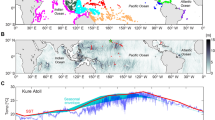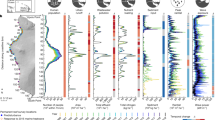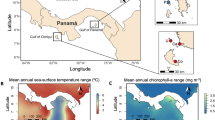Abstract
Mass coral bleaching events have become a widespread phenomenon causing serious concerns with regard to the survival of corals. Triggered by high ocean temperatures, bleaching events are projected to increase in frequency and intensity. Here, we provide a comprehensive global study of coral bleaching in terms of global mean temperature change, based on an extended set of emissions scenarios and models. We show that preserving >10% of coral reefs worldwide would require limiting warming to below 1.5 °C (atmosphere–ocean general circulation models (AOGCMs) range: 1.3–1.8 °C) relative to pre-industrial levels. Even under optimistic assumptions regarding corals’ thermal adaptation, one-third (9–60%, 68% uncertainty range) of the world’s coral reefs are projected to be subject to long-term degradation under the most optimistic new IPCC emissions scenario, RCP3-PD. Under RCP4.5 this fraction increases to two-thirds (30–88%, 68% uncertainty range). Possible effects of ocean acidification reducing thermal tolerance are assessed within a sensitivity experiment.
This is a preview of subscription content, access via your institution
Access options
Subscribe to this journal
Receive 12 print issues and online access
$209.00 per year
only $17.42 per issue
Buy this article
- Purchase on Springer Link
- Instant access to full article PDF
Prices may be subject to local taxes which are calculated during checkout



Similar content being viewed by others
References
Wilkinson, C. Status of Coral Reefs of The World: 2004 (Global Coral Reef Monitoring Network, 2004).
Hoegh-Guldberg, O. et al. Coral reefs under rapid climate change and ocean acidification. Science 318, 1737–1742 (2007).
Shamberger, K. E. F. et al. Calcification and organic production on a Hawaiian coral reef. Mar. Chem. 127, 64–75 (2011).
Bruno, J. F. & Selig, E. R. Regional decline of coral cover in the Indo-Pacific: Timing, extent, and subregional comparisons. PLoS ONE 2, e711 (2007).
Hoegh-Guldberg, O. & Smith, G. J. The effect of sudden changes in temperature, light and salinity on the population–density and export of zooxanthellae from the reef corals Stylophora pistillata Esper and Seriatopora hystrix Dana. J. Exp. Mar. Biol. Ecol. 129, 279–303 (1989).
Eakin, C. M. et al. Caribbean corals in crisis: Record thermal stress, bleaching, and mortality in 2005. PLoS ONE 5, e13969 (2010).
Baker, A., Glynn, P. W. & Riegl, B. Climate change and coral reef bleaching: An ecological assessment of long-term impacts, recovery trends and future outlook. Estuar. Coast. Shelf Sci. 80, 435–471 (2008).
Liu, G., Skirving, W. J. & Strong, A. E. Remote sensing of sea surface temperatures during 2002 barrier reef coral bleaching. Eos Trans. 84, 137–144 (2003).
Liu, G., Strong, A. E., Skirving, W. J. & Arzayus, L. F. 10th Int. Coral Reef Symp. 1783–1793 (International Coral Reef Symposium (ICRS) Proceedings, 2004).
Donner, S. D. Coping with commitment: Projected thermal stress on coral reefs under different future scenarios. Plos ONE 4, e5712 (2009).
Donner, S. D., Skirving, W. J., Little, C. M., Oppenheimer, M. & Hoegh-Guldberg, O. Global assessment of coral bleaching and required rates of adaptation under climate change. Glob. Change Biol. 11, 2251–2265 (2005).
Mitchell, J., Johns, T., Eagles, M., Ingram, W. & Davis, R. Towards the construction of climate change scenarios. Climatic Change 41, 547–581 (1999).
Simpson, M. C. et al. An Overview of Modelling Climate Change Impacts in the Caribbean Region with Contribution from the Pacific Islands (United Nations Development Programme, 2009).
Hoeke, R. K., Jokiel, P. L., Buddemeier, R. W. & Brainard, R. E. Projected changes to growth and mortality of Hawaiian corals over the next 100 years. PLoS ONE 6, e18038 (2011).
Donner, S. D, Knutson, T. R. & Oppenheimer, M. Model-based assessment of the role of human-induced climate change in the 2005 Caribbean coral bleaching event. Proc. Natl Acad. Sci. USA 104, 5483 (2007).
Barshis, D. J. et al. Protein expression and genetic structure of the coral Porites lobata in an environmentally extreme Samoan back reef: Does host genotype limit phenotypic plasticity? Mol. Ecol. 19, 1705–1720 (2010).
McClanahan, T. R. et al. in Ecological Studies Vol. 205 (ed. Caldwell, M. M.) 121–138 (Springer, 2009).
Yee, S. H., Santavy, D. L. & Barron, M. G. Comparing environmental influences on coral bleaching across and within species using clustered binomial regression. Ecol. Model. 218, 162–174 (2008).
Hoegh-Guldberg, O., Ortiz, J. C. & Dove, S. The future of coral reefs. Science 334, 1494–1495 (2011).
Pandolfi, J. M., Connolly, S. R., Marshall, D. J. & Cohen, A. L. Projecting coral reef futures under global warming and ocean acidification. Science 333, 418–422 (2011).
Pandolfi, J. M., Connolly, S. R., Marshall, D. J. & Cohen, A. L. Response to ‘the future of coral reefs’. Science 334 (2011).
Weis, V. M. The susceptibility and resilience of corals to thermal stress: Adaptation, acclimatization or both? Mol. Ecol. 19, 1515–1517 (2010).
Kleypas, J. A. & Langdon, C. et al. in Coral Reefs and Climate Change: Science and Management Vol. 61 (ed. Phinney, J. T.) 73–110 (AGU Monograph Series, Coastal and Estuarine Studies, Geophys. Union, 2006).
Langdon, C. & Atkinson, M. J. Effect of elevated pCO2 on photosynthesis and calcification of corals and interactions with seasonal change in temperature/irradiance and nutrient enrichment. J. Geophys. Res. 110, C09S07 (2005).
Schneider, K. & Erez, J. The effect of carbonate chemistry on calcification and photosynthesis in the hermatypic coral Acropora eurystoma. Limnol. Oceanogr. 51, 1284–1293 (2006).
Ohde, S. & van Woesik, R. Carbon dioxide flux and metabolic processes of coral reefs, Okinawa. Bull. Mar. Sci. 65, 559–576 (1999).
Silverman, J., Lazar, B., Cao, L., Caldeira, K. & Erez, J. Coral reefs may start dissolving when atmospheric CO2 doubles. Geophys. Res. Lett. 36, L05606 (2009).
Silverman, J., Lazar, B. & Erez, J. Effect of aragonite saturation, temperature, and nutrients on the community calcification rate of a coral reef. J. Geophys. Res. 112, C05004 (2007).
Cohen, A. L., McCorkle, D. C., de Putron, S. J., Gaetani, G. A. & Rose, K. A. Morphological and compositional changes in the skeletons of new coral recruits reared in acidified seawater: Insights into the biomineralization response to ocean acidification. Geochem. Geophys. Geosyst. 10 (2009).
Anthony, K. R. N., Kline, D. I., Diaz-Pulido, G., Dove, S. & Hoegh-Guldberg, O. Ocean acidification causes bleaching and productivity loss in coral reef builders. Proc. Natl Acad. Sci. USA 105, 17442–17446 (2008).
Wooldridge, S. A. A new conceptual model for the warm-water breakdown of the coral–algae endosymbiosis. Mar. Freshwat. Res. 60, 483–496 (2009).
Hoegh-Guldberg, O. & Jones, R. J. Photoinhibition and photoprotection in symbiotic dinoflagellates from reef-building corals. Mar. Ecol. Prog. Ser. 183, 73–86 (1999).
UNFCCC The Cancun Agreements: Outcome of the Work of the Ad Hoc Working Group on Long-term Cooperative Action Under the Convention FCCC/CP/2010/7/Add.1. (UNFCCC, 2010); available via http://go.nature.com/vKU9wU.
Buddemeier, R. W., Lane, D. R. & Martinich, J. A. Modeling regional coral reef responses to global warming and changes in ocean chemistry: Caribbean case study. Climatic Change 109, 375–397 (2011).
Meinshausen, M. et al. Greenhouse-gas emission targets for limiting global warming to 2 °C. Nature 458, 1158 (2009).
Mumby, P. J., Hastings, A. & Edwards, H. J. Thresholds and the resilience of Caribbean coral reefs. Nature 450 (2007).
Hoegh-Guldberg, O. Climate change, coral bleaching and the future of the world’s coral reefs. Mar. Freshwat. Res. 50, 839–866 (1999).
Jansen, E. & Overpeck, J. in IPCC Climate Change 2007: The Physical Science Basis (eds Solomon, S. et al.) 433–498 (Cambridge Univ. Press, 2007).
Caldeira, K. & Wickett, M. E. Ocean model predictions of chemistry changes from carbon dioxide emissions to the atmosphere and ocean. J. Geophys. Res. 110, C09S04 (2005).
Acknowledgements
The work on this analysis was supported by the UFOPLAN project FKZ 370841103 through the German Federal Environment Agency and by the Federal Ministry for the Environment, Nature Conservation and Nuclear Safety (11_II_093_Global_A_SIDS and LDCs). We thank J. Rogelj for his very helpful comments on the manuscript. O.H-G. would like to recognize support from the Australian Research Council Centre of Excellence in Reef Studies and the Global Change Institute. We acknowledge the modelling groups, the Program for Climate Model Diagnosis and Intercomparison and the WCRP1’s Working Group on Coupled Modelling for making available the WCRP CMIP3 multi-model data set.
Author information
Authors and Affiliations
Contributions
A.G., K.F. and M. Meinshausen contributed equally to this paper. K.F. and M. Meinshausen designed the study. A.G., K.L. and M. Mengel analysed data with contributions by K.F. and M. Meinshausen. M. Meinshausen, K.F., S.D. and O.H-G. wrote the paper.
Corresponding author
Ethics declarations
Competing interests
The authors declare no competing financial interests.
Supplementary information
Supplementary Information
Supplementary Information (PDF 2200 kb)
Rights and permissions
About this article
Cite this article
Frieler, K., Meinshausen, M., Golly, A. et al. Limiting global warming to 2 °C is unlikely to save most coral reefs. Nature Clim Change 3, 165–170 (2013). https://doi.org/10.1038/nclimate1674
Received:
Accepted:
Published:
Issue Date:
DOI: https://doi.org/10.1038/nclimate1674
This article is cited by
-
Speed of environmental change frames relative ecological risk in climate change and climate intervention scenarios
Nature Communications (2024)
-
Systematic review of the uncertainty of coral reef futures under climate change
Nature Communications (2024)
-
Transient dynamics mask the resilience of coral reefs
Theoretical Ecology (2024)
-
Physiological and biochemical responses of soft coral Sarcophyton trocheliophorum to doxycycline hydrochloride exposure
Scientific Reports (2023)
-
Solar radiation, temperature and the reproductive biology of the coral Lobactis scutaria in a changing climate
Scientific Reports (2023)



